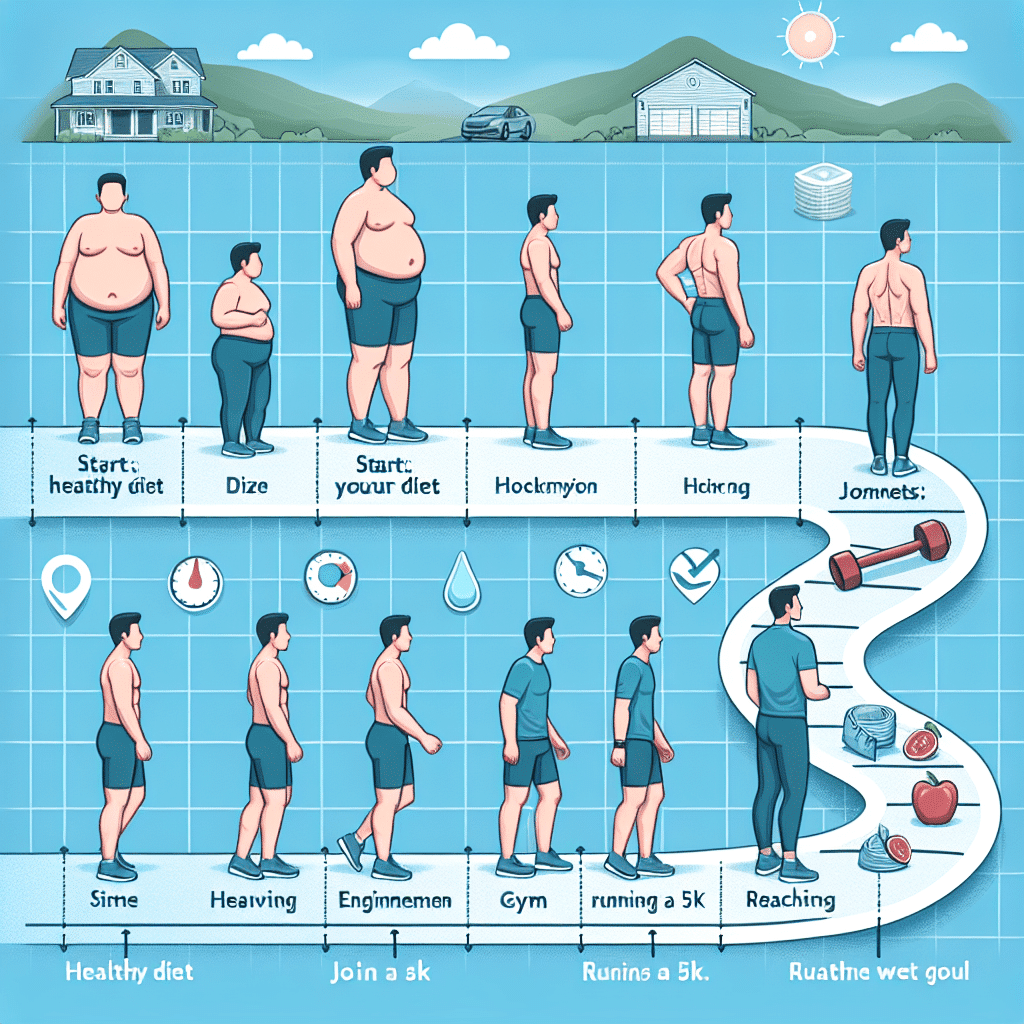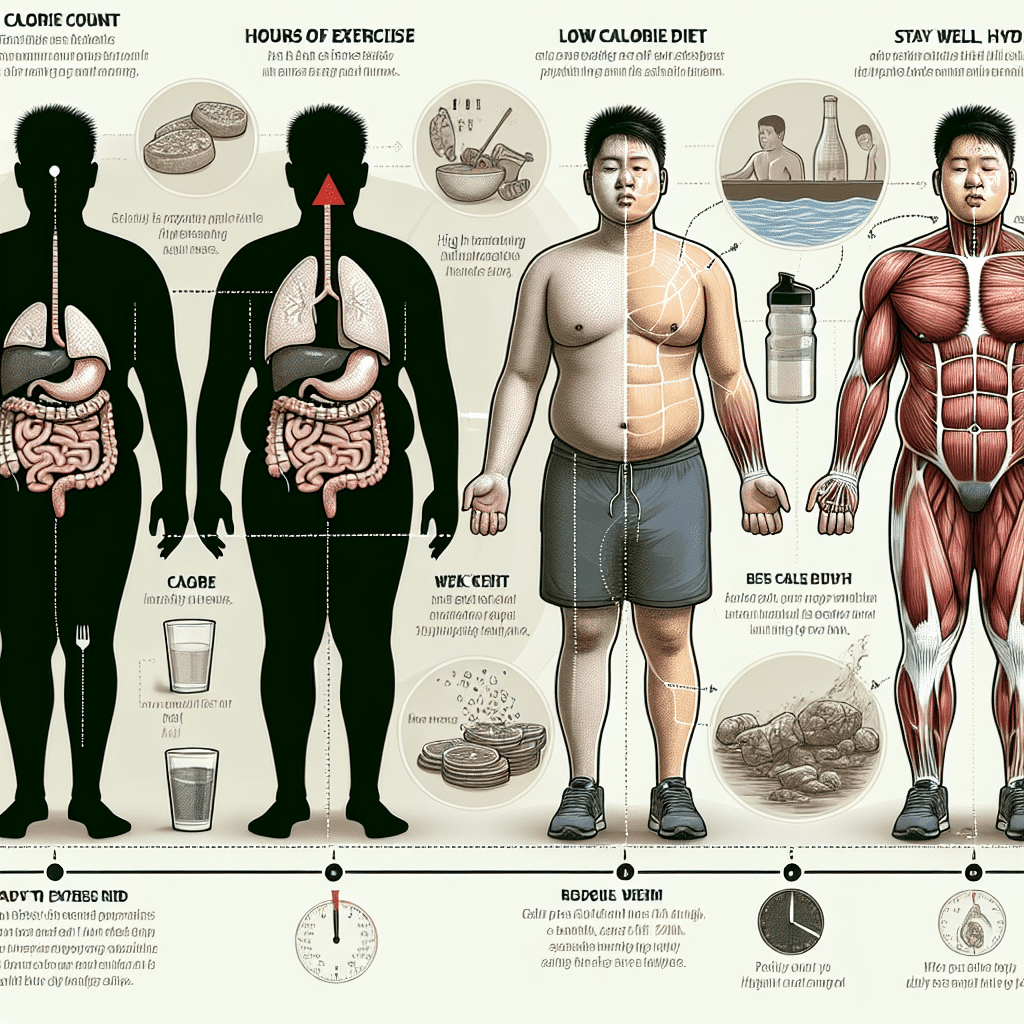Shedding extra weight is a journey unique to each individual. A question commonly pondered upon at the start of this journey is, “How long does it take to lose 20 pounds?” The curiosity is understandable; we are a society that values instantaneous results. However, the process of weight loss is neither immediate nor one-size-fits-all. It varies based on several factors and is influenced by the person’s current weight, lifestyle, diet, level of physical activity, and overall health.
The longevity of the weight loss journey can be daunting for many. This journey involves making significant lifestyle changes, incorporating healthy choices, and exercising regularly. When trying to lose weight, many people find themselves trapped in a cycle of rapid weight loss followed by an inevitable weight gain. This phenomenon, often referred to as yo-yo dieting, is prevalent due to unrealistic dieting and workout plans that promise quick results. We must remember that healthy weight loss is a gradual process and the pace set should be sustainable in the long run.
One hard truth we need to face is that losing 20 pounds doesn’t have a fixed timeline. A considerable number of factors come into play when relating to weight loss progress, thus cautioning us against comparing our progress with others. Understanding your unique body and respecting its pace is paramount for a successful weight loss journey. This approach helps keep discouragement at bay and contributes significantly to a positive and healthy mindset throughout the process.
Consequently, it’s essential to keep in mind that losing weight healthily isn’t merely about dieting or spending hours in the gym. It’s about making mindful decisions that support your physical and mental well-being. Engaging in body-appropriate exercise routines, fueling the body with nutritious food, managing stress, and ensuring ample rest, all contribute significantly to the weight-loss process.
In essence, journeying through weight loss is a transformation that’s challenging, yet profoundly rewarding. It calls for patience, determination and the understanding that each person’s body reacts differently to various weight loss strategies. The so-called ‘perfect body’ takes time to achieve, but through determination, commitment, and a self-love, it is unquestionably attainable.
Understanding The Basic Science of Weight Loss
Weight loss is an intricate process that involves many components. One needs to decipher the art and science of weight management to achieve realistic and healthy weight loss expectations. Contributing elements include understanding the concept of calorie deficit, gaining awareness of different metabolic rates, and recognizing the role of exercise.
Exploring the Calorie Deficit Concept
A simple equation lies at the heart of weight loss: calorie consumption must be less than calorie expenditure resulting in a ‘calorie deficit.’ This term refers to the process where the body is forced to use stored fat as a source of energy, in turn initiating weight loss. Assimilating this basic yet powerful component influences your weight loss timeline significantly.
Our bodies require a particular amount of calories to sustain basic daily functions. Consuming calories beyond our body’s requirement leads to storing excess calories as fat, contributing to weight gain. Conversely, consuming fewer calories than the body’s requirement, or generating a calorie deficit, pushes the body to dip into stored fat as an energy source, leading to weight loss. The amount of calorie deficit required for losing 1 pound of body weight is approximately 3500 calories.
Real-world examples of a consistent calorie deficit involve making simple, long-lasting changes to the diet. Prefer whole, unprocessed foods over processed ones packed with excess fats and sugars. Portion control is another crucial factor – consuming a reasonable size of the meal helps prevent overeating while still satisfying hunger.
Identifying Different Metabolic Rates
Understanding the nuances of metabolic rates is pivotal to the process of losing weight. Metabolic rate or metabolism is the process your body uses to convert food into energy. Each individual possesses a unique metabolic rate, with some having faster rates, leading to a quicker calorie burn and hence, influencing the speed of weight loss.
Factors that affect metabolic rates include age, sex, muscle mass, physical activity, and hormones. Therefore, it is crucial to identify one’s metabolic rate and use it as a basis for tailoring a diet and exercise plan. In this context, it is also important to grasp that crash diets or rapid weight loss plans can potentially slow down metabolism, complicating the pounds shedding duration.
While diet plays a crucial part in a successful weight-loss journey, it is not the only mitigating factor controlling your metabolic rate. Exercise, specifically strength training, is instrumental in enhancing metabolic rate, which significantly aids weight loss progress.
Delving into The Role of Exercise
Much like maintaining a calorie deficit and understanding metabolic rates, exercise plays an integral part in catalyzing weight loss. Not only does it burn calories, leading to an increased calorie deficit, it also aids in enhancing one’s metabolic rate. A variety of exercises can aid in weight loss and prevent fitness plateaus.
The most effective exercise regimes hinge on a balance of cardio for calorie burn and strength training for muscle development. Cardiovascular exercises like running, swimming or cycling are excellent calorie burners. On the other hand, strength training aids in developing lean muscle mass, which boosts metabolism and contributes to weight loss even when the body is at rest.
The choice in variety of exercise is crucial to prevent your body from adapting to a certain type of physical activity, a phenomenon known as plateauing. Including a variety of workouts, both cardio and strength-based, ensures continuous weight loss and contributes to an achievable and realistic fat loss timeline.
In conclusion, understanding the science behind weight loss is a fundamental step in managing the weight loss process. Recognizing and putting into practice, concepts such as maintaining a calorie deficit, understanding one’s metabolic rate and utilizing the benefits of exercises can contribute towards a feasible and sustainable weight loss journey.
 The Healthy Range of Weight Loss
The Healthy Range of Weight Loss
Setting realistic weight loss expectations encourages steady progress and prevents the potential pitfalls of rapid weight loss. Identifying an acceptable pace of shedding pounds, understanding the progressive nature of weight loss and exploring popular diets, all contribute to a sustainable weight loss journey.
Unveiling the Acceptable Pace of Shedding Pounds
Every person’s weight loss journey is unique, deeply influenced by their body’s makeup, dietary habits, and level of physical activity. However, health organizations generally agree that a loss of 1-2 pounds per week represents a safe, sustainable weight loss timeline. This pace aids in establishing long term habits, thus preventing a rebound weight gain, a common issue with rapid weight loss methods.
Losing weight too quickly can be dangerous, leading to muscle loss, nutrient deficiencies, fatigue, and a slow metabolism. There’s also the risk of gallstones and other health issues. Rapid weight loss can often feel demotivating as well, because the “quick fix” weight loss often emerges from water and muscle loss instead of fat.
Therefore, sustainable weight loss requires patience and consistency. Consider a person who wants to lose 20 pounds. By following a healthier lifestyle approach that incorporates a balanced diet and regular exercise, they could meet their goal in approximately 10-20 weeks, exhibiting a healthy weight reduction.
Discussing Progressive Weight Loss
Weight loss is often non-linear, meaning it doesn’t necessarily happen at a steady, predictable rate. One might lose weight faster initially due to loss of water weight, but as time progresses, the rate may slow down. Understanding this aspect is important because it helps set realistic weight loss expectations and keeps motivation high.
Our bodies are excellent at adapting. When we cut down on calorie intake or increase physical activity, our bodies initially respond by shedding excess weight. But over time, they adapt to these new conditions, leading to slower weight loss or even weight loss plateaus.
To navigate this, try switching up workout routines regularly to keep challenging your body. Make small changes to your diet occasionally and keep hydration levels optimized. Stable, progressive weight loss often comes from a persistent, varied approach to diet and physical activity.
Exploring Popular Weight Loss Diets
Several diets have gained immense popularity for their weight loss benefits. These include the low-carb, high-fat Ketogenic diet; the Mediterranean diet with its focus on plant-based foods and healthy fats; and the Paleo diet that eliminates processed foods and focuses on food our ancestors supposedly ate. Each of these diets has its merits and have helped many individuals lose weight.
However, each also has its limitations. The ketogenic diet, for example, may be problematic for those with certain health conditions, while the paleo diet can be restrictive and challenging to follow. It’s essential to consider these factors and analyse how a diet fits into one’s lifestyle and dietary preferences before committing to it.
Adopting a diet should not mean compromising on nutrition; it is essential to tailor a diet plan that caters to individual needs and is rich in various nutrients. Adopting a diet that aligns with one’s lifestyle, palate preferences, and health requirements can lead to an enjoyable weight management period and contribute to overall well-being.
Understanding the healthy pace of weight loss, being aware of the progressive nature of weight loss, and exploring various weight loss diets aids in fostering a positive outlook towards this journey. It confirms that weight loss is not merely about shedding pounds but about achieving a healthier and happier version of oneself.
The Role of Mental Health & Consistent Motivation
While physical elements like exercise and diet are crucial to weight loss, the role of mental health and consistent motivation is equally paramount. A positive attitude, adequate sleep, and a balanced relationship with food can significantly influence your weight loss journey.
Attitude Toward Weight Loss Journey
A person’s mindset and the patience they exhibit throughout their weight loss journey can make a significant impact on their progress and overall experience. Embracing the fact that weight loss should be a healthy, steady, and nonlinear process is crucial to setting up a realistic weight loss timeline and maintaining motivation.
It’s inevitable to encounter challenges along the way. The key to overcoming them is to remain motivated and committed. Set small, achievable goals and celebrate each milestone you reach. Keep a journal to monitor your progress and reflect on your experiences. Surround yourself with supportive people who understand your aim and encourage your efforts.
Mood also plays a significant role in weight management. Stress, anxiety, and depression can interfere with healthy eating and exercise habits and make it difficult to lose weight. On the other hand, a positive, confident mood can inspire you to stay on track with your weight loss regime and help you navigate challenges with more ease.
Importance of Sleep & Restoration
Good quality, ample sleep is a cornerstone of weight loss that is often overlooked. Sleep deprivation can lead to an increased appetite, low motivation for physical activity and a slower metabolism, thus hindering weight loss progress.
Establishing good sleep hygiene can aid in more effective resting. Develop a consistent sleep schedule, make your sleeping environment comfortable, minimize light and noise, and avoid stressful activities before bedtime. All these habits help ensure you’re getting the quality sleep you need to support your weight loss efforts.
Complete recovery is vital in maintaining weight loss consistency. When you sleep, your body heals and regrows tissues, including muscles that can help burn more calories and reduce fat mass. This connection exemplifies the relationship between sleep, recovery, and weight loss.
Nurturing a Healthy Relationship with Food
How we perceive food can profoundly shape our dieting for weight loss. We must view food as a source of nourishment and pleasure rather than the enemy. Punitive dieting and fear of food can lead to an unhealthy relationship with food. Instead, focus on enjoying a balanced, varied diet packed with nutrients and flavours.
Emotional eating can also impede weight loss efforts. It’s critical to recognize the triggers for emotional eating and develop strategies to manage them. This might involve seeking support from a mental health professional, practicing stress management techniques, and finding healthier ways to cope with emotions, apart from relying on food.
Mindful eating is another valuable tool. Pay attention to your hunger and fullness cues. Eat when you’re truly hungry, savour each bite, and stop when you’re comfortably full. Decoding these hunger signals can lead to a much healthier attitude towards food and a more realistic weight loss timeline.
In conclusion, mental wellbeing, consistent motivation and a balanced relationship with food and sleep are as vital as a regular exercise routine and a balanced diet in the weight loss journey. Fostering these habits can contribute to a healthier, happier, more successful weight loss experience.
 Embrace Your Unique Weight Loss Journey
Embrace Your Unique Weight Loss Journey
Weight loss is a multi-layered process, uniquely intertwined with physical and emotional factors. From understanding the scientific aspect of weight loss to adopting healthy habits, every element contributes to this profound journey. Weight loss is not simply a numerical game where you aim to clock lower numbers on the scale each week. Instead, it is a holistic, gradual journey of self-discovery and self-improvement that nurtures not just physical, but mental and emotional well-being too.
We have traversed the intricate landscape of understanding how our body works to lose weight, discovered the importance of intentional patience and nurturing a positive attitude, explored the role of adequate sleep, and learned about cultivating a healthy relationship with the food we consume. Recognizing that weight loss can be influenced by numerous factors, we carry a better understanding of why weight loss progress is unique to each person and why comparisons seldom benefit anyone.
As we delved into different metabolic rates, the benefits of tailored exercise routines, striking the balance between rapid weight loss and a healthy weight reduction, we learned that everyone’s weight loss journey is profoundly unique. It’s crucial not to persuade oneself into a perfect “20 pounds loss schedule”, but instead, embrace the journey that leads to a healthier, happier version of oneself.
Remember that weight loss progress may ebb and flow, but what matters is consistent effort and unyielding commitment. Sustaining motivation over time might seem challenging, but remember, every small positive change contributes significantly to the more significant journey. Each balanced meal, every minute of exercise, and each night of good sleep, adds to your goal. Even setbacks can be sources of learning and growth in this journey, adding resilience and confidence, leading to a healthier lifestyle.
The road to weight loss is not a straight path, but with patience, persistence, and most importantly, self-love, it is a journey that everyone can embark on. Remember, your journey is yours alone – unique, just like you. It might take time, and that’s okay. The significant part is that you have taken a step towards a healthier you. Embrace the journey, stay patient, and keep moving forward. You’ve got this!


 The Healthy Range of Weight Loss
The Healthy Range of Weight Loss Embrace Your Unique Weight Loss Journey
Embrace Your Unique Weight Loss Journey

